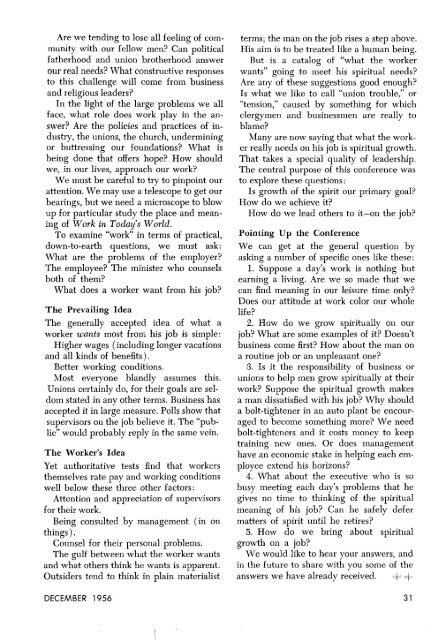You also want an ePaper? Increase the reach of your titles
YUMPU automatically turns print PDFs into web optimized ePapers that Google loves.
Are we tending to lose all feeling of community<br />
with our fellow men? Can political<br />
fatherhood and union brotherhood answer<br />
our real needs? What constructive responses<br />
to this challenge will come from business<br />
and religious leaders?<br />
In the light of the large problems we all<br />
face, what role does work play in the answer?<br />
Are the policies and practices of industry,<br />
the unions, the church, undermining<br />
or buttressing our foundations? What is<br />
being done that offers hope? How should<br />
we, in our lives, approach our work?<br />
We must be careful to try to pinpoint our<br />
attention. We may use a telescope to get our<br />
bearings, but we need a microscope to blow<br />
up for particular study the place and meaning<br />
of Work in Today's World.<br />
To examine "work" in terms of practical,<br />
down-to-earth questions, we must ask:<br />
What are the problems of the employer?<br />
The employee? The minister who counsels<br />
both of them?<br />
What does a worker want from his job?<br />
The Prevailing Idea<br />
The generally accepted idea of what a<br />
worker wants most frorn his job is simple:<br />
Higher wages (including longer vacations<br />
and all kinds of benefits).<br />
Better working conditions.<br />
Most everyone blandly assumes this.<br />
Unions certainly do, for their goals are seldOlTI<br />
stated in any other terms. Business has<br />
accepted it in large measure. Polls show that<br />
supervisors on the job believe it. The "public"<br />
would probably reply in the same vein.<br />
The Worker's Idea<br />
Yet authoritative tests find that workers<br />
themselves rate pay and working conditions<br />
well below these three other factors:<br />
Attention and appreciation of supervisors<br />
for their work.<br />
Being consulted by management (in on<br />
things) .<br />
Counsel for their personal problems.<br />
The gulf between what the worker wants<br />
and what others think he wants is apparent.<br />
Outsiders tend to think in plain materialist<br />
DECEMBER 1956<br />
terms; the man on the job rises a step above.<br />
His aim is to be treated like a human being.<br />
But is a catalog of "what the worker<br />
wants" going to meet his spiritual needs?<br />
Are any of these suggestions good enough?<br />
Is what we like to call "union trouble," or<br />
"tension," caused by something for which<br />
clergymen and businessmen are really to<br />
blame?<br />
Many are now saying that what the worker<br />
really needs on his job is spiritual growth.<br />
That takes a special quality of leadership.<br />
The central purpose of this conference was<br />
to explore these questions:<br />
Is growth of the spirit our primary goal?<br />
How do we achieve it?<br />
How do we lead others to it-on the job?<br />
Pointing Up the Conference<br />
We can get at the general question by<br />
asking a number of specific ones like these:<br />
1. Suppose a day's work is nothing but<br />
earning a living. Are we so made that we<br />
can find meaning in our leisure time only?<br />
Does our attitude at work color our whole<br />
life?<br />
2. Row do we grow spiritually on our<br />
job? What are some examples of it? Doesn't<br />
business come first? How about the man on<br />
a routine job or an unpleasant one?<br />
3. Is it the responsibility of business or<br />
unions to help men grow spiritually at their<br />
work? Suppose the spiritual growth makes<br />
a man dissatisfied with his job? Why should<br />
a bolt-tightener in an auto plant be encourM<br />
aged to become something more? We need<br />
bolt-tighteners· and it costs money to keep<br />
training new ones. Or does management<br />
have an economic stake in helping each employee<br />
extend his horizons?<br />
4. What about the executive who is so<br />
busy meeting each day's problems that he<br />
gives no time to thinking of the spiritual<br />
meaning of his job? Can he safely defer<br />
matters of spirit until he retires?<br />
5. How do we bring about spiritual<br />
growth on a job?<br />
We would like to hear your answers, and<br />
in the future to share with you some of the<br />
answers we have already received. =f: =f:<br />
31
















